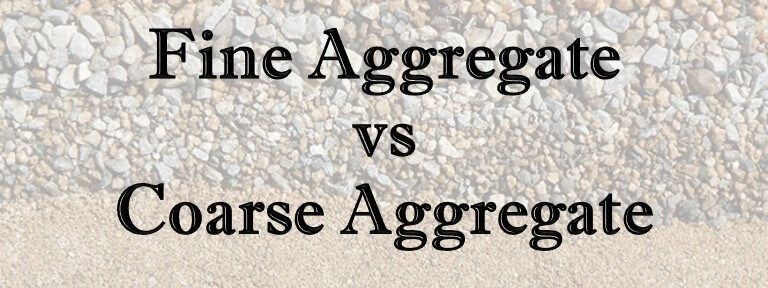Aggregates are essential components of concrete. They act as inert materials in concrete. Fine aggregate and coarse aggregate are the two main types of aggregate for concrete. As the name indicates, they are basically classified depending on the sizes of aggregate particles.
Fine Aggregate vs Coarse Aggregate

Fine and coarse aggregates have some major differences. Sources of main differences between deep and shallow footings are definition, size of particles, materials, sources, surface area, function in concrete, uses, etc.
In the following table, the main differences between Fine and coarse aggregate are given:
| Sl No | Scopes | Fine Aggregate (FA) | Coarse Aggregate (CA) |
|---|---|---|---|
| 1 | Definition | Fine aggregates are small-size filler materials in construction. | Coarse aggregates are larger-size filler materials in construction. |
| 2 | Size of Particles | Fine aggregates are the particles that pass through a 4.75 mm sieve and retain on a 0.075 mm sieve. | Coarse aggregates are the particles that retain on a 4.75 mm sieve. |
| 3 | Materials | Sand, surki, stone screenings, burnt clays, cinders, fly ash, etc are used as fine aggregate in concrete. | Brick chips (broken bricks), stone chips (broken stones), gravels, pebbles, clinkers, cinders, etc. are used as coarse aggregate in concrete. |
| 4 | Sources | River sand or machine sand, crushed stone sand, and crushed gravel sand are the major sources of fine aggregate. | Dolomite aggregates, crushed gravel or stone, and the natural disintegration of rock are the major sources of coarse aggregate. |
| 5 | Surface Area | The surface area of fine aggregates is higher. | The surface area of coarse aggregates is less than fine aggregates. |
| 6 | Function in Concrete | The voids between the coarse aggregate are filled up by fine aggregate. | Coarse aggregate acts as inert filler material for concrete. |
| 7 | Uses | Fine aggregates are used in mortar, plaster, concrete, filling of road pavement layers, etc. | Coarse aggregates are mainly used in concrete, railway track ballast, etc. |
{adselite}
In the realm of concrete construction, understanding the disparities between fine and coarse aggregates is essential for achieving optimal structural and functional outcomes. Fine aggregates, characterized by their smaller particle sizes, fill voids between coarse aggregates and find applications in mortar, plaster, concrete, and road pavement. On the other hand, coarse aggregates, with larger particle sizes, serve as inert filler material in concrete and are commonly used in railway track ballast and concrete mixtures. By comprehending the unique attributes and roles of these aggregates, professionals can make informed decisions in designing and constructing durable and resilient concrete structures.

